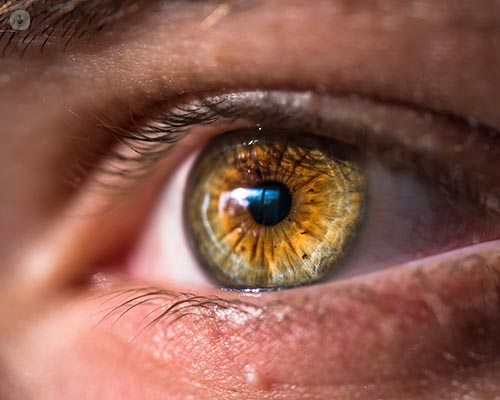An introduction to Anti-VEGF treatment
Written in association with:Anti-VEGF treatment is a powerful tool in managing certain eye conditions, particularly those related to abnormal blood vessel growth in the retina. This article aims to provide a clear and understandable overview of what Anti-VEGF treatment involves, its benefits, and what patients can expect during the process. Revered consultant ophthalmologist Mr Andre Litwin provides a guide to the treatment, including what conditions it can be used for and the benefits.

What is anti-VEGF treatment?
Anti-VEGF stands for "anti-vascular endothelial growth factor." VEGF is a protein that stimulates the growth of new blood vessels. While this is essential for healing and growth, excessive or abnormal blood vessel growth in the eye can lead to vision problems. Anti-VEGF medications inhibit the action of VEGF, helping to control unwanted blood vessel growth.
What conditions are treated with anti-VEGF?
Anti-VEGF treatments are primarily used for conditions such as age-related macular degeneration (AMD), diabetic retinopathy, and retinal vein occlusion. Age-related macular degeneration (AMD) is a common condition in older adults that affects the macula, the part of the retina responsible for sharp central vision. In "wet" AMD, abnormal blood vessels grow under the retina, leading to vision loss. Diabetic retinopathy occurs in individuals with diabetes and involves damage to the blood vessels in the retina. Anti-VEGF can help reduce the growth of abnormal vessels and prevent further vision impairment. Retinal vein occlusion is a blockage of veins in the retina that can lead to fluid leakage and swelling. Anti-VEGF medications help reduce this swelling and prevent further damage.
How are anti-VEGF injections administered?
Anti-VEGF treatment is administered through injections directly into the eye. While the idea of an eye injection might sound daunting, the procedure is relatively quick and performed under local anaesthesia to minimise discomfort. Your ophthalmologist will use a fine needle to deliver the medication into the vitreous, the jelly-like substance inside your eye.
What happens during the treatment process?
The number of injections required can vary depending on the condition and how well your eye responds to the treatment. Initially, you might receive injections monthly, but over time, the frequency often decreases. Your ophthalmologist will monitor your progress through regular check-ups and imaging tests like OCT (optical coherence tomography) to assess the retina's condition.
What are the benefits of Anti-VEGF treatment?
The primary benefit of Anti-VEGF treatment is the preservation and improvement of vision. Many patients experience stabilisation of their condition, and some even see a significant improvement in vision. Early treatment and regular monitoring are crucial for the best outcomes.
What are the potential side effects?
As with any medical treatment, there are potential side effects. Common side effects include mild discomfort, redness, or a feeling of something in the eye. More serious but rare side effects include infection, increased eye pressure, or retinal detachment. Your ophthalmologist will discuss these risks with you and take steps to minimise them.
How can I prepare for my appointment?
Before your first injection, your ophthalmologist will perform a thorough eye examination and review your medical history. It’s important to communicate any concerns or questions you might have. On the day of the treatment, ensure you have someone to accompany you, as your vision may be temporarily affected.
Understanding Anti-VEGF treatment and its role in managing eye conditions can help alleviate concerns and prepare you for what to expect. Your ophthalmologist is your best resource for information tailored to your specific situation, ensuring you receive the best possible care for your vision health.
If you would like to book an appointment with Mr Litwin, do not hesitate to do so by visiting his Top Doctors profile today.



